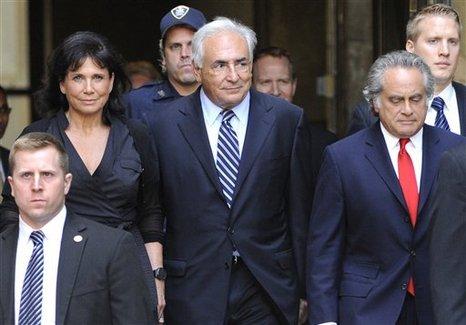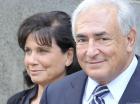View photo

0
842
All charges against Dominique Strauss-Kahn dismissed
Dominique Strauss-Kahn leaves Manhattan State Supreme court with his wife Anne Sinclair, Tuesday, Aug. 23, 2011, in New York. A New York judge dismissed the sexual assault case against Strauss-Kahn, but the order is on hold until an appeals court rules on his accuser's request for a special prosecutor. - Louis Lanzano /AP Photo
------
NEW YORK -- Dominique Strauss-Kahn, his wife by his side, walked to a Manhattan courtroom through shouting protesters carrying signs that read: "Put the rapist on trial - not the victim."
Just hours later, the French diplomat was a free man - his attempted rape case formally dismissed.
The former International Monetary Fund leader can leave the United States after he's handed back his passport - which could happen as soon as Wednesday - but he will return to France to face an uncertain future that includes another investigation into an alleged sexual assault.
"I can't wait to get back to my country, but there are some things I have to do first," he said in French outside the posh Tribeca town home where he was kept under house arrest.
The New York case was dismissed Tuesday after prosecutors said they no longer trusted the hotel maid who accused him of attacking her in his luxury suite on May 14. Though evidence showed Strauss-Kahn had a sexual encounter with Nafissatou Diallo, prosecutors said the accuser was not credible because of lies she has told, including an earlier false rape claim.
But an investigation continues in France into claims by novelist Tristane Banon, who said Strauss-Kahn tried to rape her in 2002. She recently filed a new criminal complaint. Strauss-Kahn's lawyers have called her account "imaginary."
And in New York, Strauss-Kahn still faces a lawsuit Diallo filed against him. Her attorneys said they would aggressively litigate the civil case - but it could take two years before it gets to trial.
Strauss-Kahn may also take legal action of his own against Diallo, said one of his lawyers, Benjamin Brafman. He could file his own claims to counter Diallo's lawsuit, "and that's certainly a consideration," Brafman told The Associated Press in an interview. "Because she did lie, and he has suffered enormous damages as a result of those lies."
The case drew global attention and left both the accuser and the accused - a one-time contender for the French presidency - with tattered reputations.
While Diallo's account of the encounter has been recounted in interviews, her lawsuit and the now-defunct prosecution, Strauss-Kahn doesn't want to detail his version of what happened at the luxurious hotel, Brafman said.
"What happened in that room, so long as we have now confirmed that it wasn't criminal, is really not something that needs to be discussed publicly," he said.
Strauss-Kahn appeared resolute at the hearing. He smiled and shook hands with his biographer as his wife, journalist Anne Sinclair, sat nearby. The couple left court without speaking to reporters, but Strauss-Kahn later issued a statement describing the case as "a nightmare for me and my family."
"I want to thank all the friends in France and in the United States who have believed in my innocence, and to the thousands of people who sent us their support personally and in writing," the statement said. "I am most deeply grateful to my wife and family who have gone through this ordeal with me."
Diallo, 33, claimed that the 62-year-old diplomat chased her down, grabbed her crotch and forced her to perform oral sex when she arrived to clean his suite.
He was charged with a criminal sex act, attempted rape and sexual abuse, and was jailed for nearly a week before being released on $1 million bail under pricey house arrest.
DNA evidence showed Strauss-Kahn's semen on Diallo's work clothes, and prosecutors on Monday revealed additional details that led them to believe a sexual encounter occurred.
Strauss-Kahn's attorneys contended it wasn't forced.
"At the very first appearance ... I said in open court that this was not a forcible encounter," Brafman said outside court. "You can engage in inappropriate behavior, perhaps, but that is much different than a crime. And this case was treated as a crime - when it was not."
When prosecutors brought charges, they said their evidence was strong and Diallo was credible. But in July they said she had told them a series of troubling falsehoods, including a phony account of having been gang-raped in her native Guinea. She told interviewers she was raped in her homeland under other circumstances and embellished the account to enhance her 2003 application for political asylum.
Like many sexual assault cases, in which the accused and the accuser are often the only witnesses, the Strauss-Kahn case hinged heavily on the maid's believability. Prosecutors said Monday they uncovered further information that made it impossible to continue their investigation.
"Our inability to believe the complainant beyond a reasonable doubt means, in good faith, that we could not ask a jury to do that," Assistant District Attorney Joan Illuzzi-Orbon said in formally recommending the case be dismissed.
She added that prosecutors' decision to drop the case "does not mean that we, in any way, condone the defendant's behavior."
Diallo maintains that Strauss-Kahn attacked her, and that she initially lied about the asylum application because she feared what would happen if she had told the truth. Diallo came forward in a series of interviews with media after it became clear prosecutors were losing faith in her credibility. The Associated Press does not usually name people who say they are victims of sexual assault unless they come forward publicly, as Diallo and Banon have done.
Diallo did not attend the hearing. Her attorney Kenneth Thompson said outside court that prosecutors abandoned his client.
"No man, no matter how much power, money and influence he has, has a right to sexually assault a woman," Thompson said. "We are disappointed that District Attorney Vance apparently does not believe in equal justice under the law and has denied an innocent woman a day in court."
State Supreme Court Justice Michael Obus said he would dismiss the case, but there was one more legal twist to get through: He first wanted an appeals court to hear a request from Diallo's attorneys to keep the case alive by appointing a special prosecutor. They had argued Vance was biased. The criminal case ended about two hours later, when the higher court agreed with Obus that there was no legal basis for removing the district attorney.
Associated Press Writers Tom Hays and Verena Dobnik and Associated Press Television News Reporter Bonny Ghosh contributed to this report.
PUB
Photos From This Album
PUB
Author
KHADHORMEDIA
Le Top des Tops Médias, KHADHOR' MEDIA, C'est Trop Top !
Le Top des Tops Médias, KHADHOR' MEDIA, C'est Trop Top !
Facebook
Recommend
Photo info






